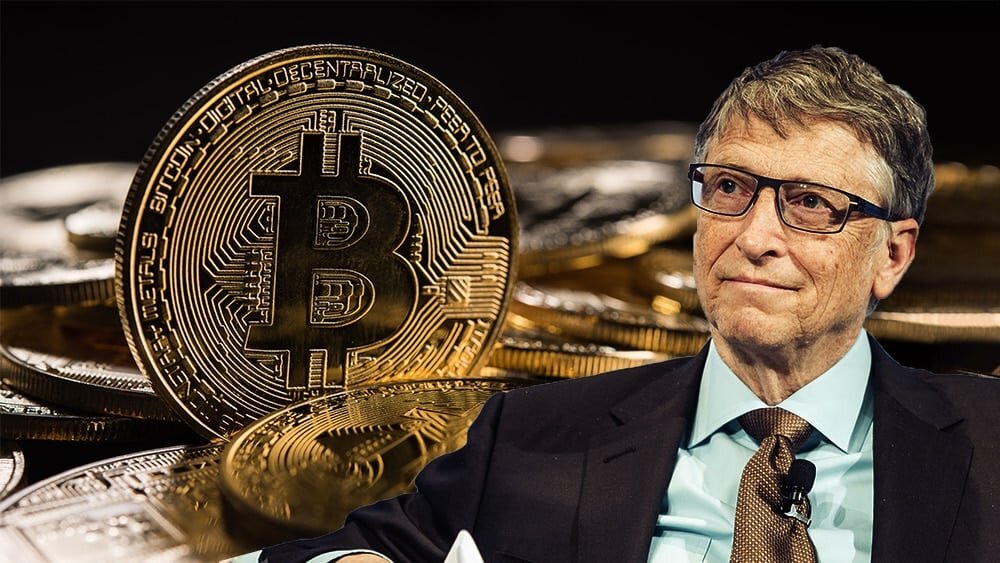In the era of technology and innovation, few names carry the weight and influence of Bill Gates. As the co-founder of Microsoft, Gates revolutionized the computer industry and became one of the wealthiest individuals in the world. Over the years, his interests have expanded beyond software and hardware, extending into philanthropy, healthcare, and energy. In recent times, however, Gates has also made significant strides in cryptocurrencies, leveraging his expertise and resources to explore their potential and promote their responsible adoption. This article delves into Bill Gates crypto influence, examining his views, investments, and initiatives in the rapidly evolving world of digital currencies.
The Shift Towards Cryptocurrencies
Cryptocurrencies have heralded a paradigm shift in finance and transactions. As society embraces the concept of decentralized finance, cryptocurrencies have emerged as a viable alternative form of money. Bitcoin, the pioneering cryptocurrency introduced by Satoshi Nakamoto in 2009, propelled the concept of digital currencies into the mainstream consciousness. Bill Gates crypto meteoric rise in value and disruptive potential captured the attention of investors, technologists, and visionaries alike.
Bill Gates, renowned for his far-reaching influence in the technology industry, possesses a keen eye for emerging trends and disruptive innovations. Recognizing the transformative power of cryptocurrencies, Gates has closely followed their trajectory and implications. As the first and most prominent cryptocurrency, Bitcoin has been the focal point of his attention.
Gates understands that cryptocurrencies possess the capacity to challenge and potentially reshape traditional financial systems. By leveraging blockchain technology—a decentralized and transparent ledger that underlies cryptocurrencies—financial transactions can occur without intermediaries such as banks. This disruption can empower individuals, enhance financial inclusivity, and streamline the cumbersome processes often associated with traditional banking systems.
While Gates acknowledges the tremendous potential of cryptocurrencies, he is also aware of the challenges and risks they entail. He has voiced concerns about the anonymous nature of specific cryptocurrencies, which can facilitate illicit activities such as money laundering and terrorism financing. Additionally, Gates has drawn attention to the significant energy consumption associated with cryptocurrency mining, particularly in the case of Bitcoin, which relies on resource-intensive proof-of-work algorithms.
Despite his reservations, Gates has not shied away from engaging with cryptocurrencies. In 2014, Microsoft, under Gates' guidance, made headlines by announcing its acceptance of Bitcoin as a form of payment for certain products and services. This move was seen as a significant step in the mainstream adoption of cryptocurrencies and brought them closer to everyday users. However, it is worth noting that Microsoft later ceased accepting Bitcoin due to its price volatility and limited practical use as a medium of exchange.
Gates' interest extends beyond the direct use of cryptocurrencies. He places a greater emphasis on the underlying technology, blockchain, which enables secure and transparent transactions. He has expressed optimism about the transformative applications of blockchain technology and its potential to drive efficiency, transparency, and accountability in various sectors.
In line with his commitment to addressing global challenges, Gates has also explored the potential of cryptocurrencies and blockchain technology in promoting financial inclusion and combating poverty. Through Bill and Melinda Gates Foundation, one of the largest charitable organizations globally, Gates has supported initiatives that aim to harness digital currencies for the betterment of underserved populations. The foundation has invested in research and projects exploring the use of cryptocurrencies to provide financial services to the unbanked and alleviate poverty.
Moreover, Gates has established the Breakthrough Energy Ventures Fund, which invests in companies working towards innovative clean energy solutions. While not directly related to cryptocurrencies, this venture aligns with Gates' concerns regarding the energy consumption associated with cryptocurrency mining. It reflects his broader commitment to sustainability and the mitigation of environmental challenges through technological advancements.
Despite his interest and involvement in crypto, Gates remains cautious and advises the public to approach cryptocurrency investments with prudence. He emphasizes the highly volatile nature of cryptocurrencies, highlighting the risks and urging individuals to exercise caution and invest only what they can afford to lose.

Bill Gates's Crypto Perspective
Bill Gates, a prominent figure in the technology industry and a renowned philanthropist, possesses a nuanced perspective on cryptocurrencies. While he recognizes digital currencies' potential benefits and disruptive nature, he has also expressed valid concerns and reservations regarding their usage.
One of the critical concerns Gates has raised is the potential for cryptocurrencies to facilitate illicit activities due to their inherent anonymity. While blockchain technology provides a transparent and decentralized ledger for recording transactions, some cryptocurrencies offer varying degrees of anonymity and privacy. Gates has expressed apprehension that this feature could be exploited by individuals or organizations engaged in money laundering, terrorism financing, or other illegal projects. He believes that regulations and oversight should be in place to prevent the misuse of cryptocurrencies and ensure compliance with anti-money laundering (AML) and know-your-customer (KYC) regulations.
Another significant concern highlighted by Gates is the environmental impact of cryptocurrency mining. Mining is creating new coins and verifying transactions on a blockchain network. The most well-known cryptocurrency, Bitcoin, utilizes a proof-of-work consensus algorithm that requires substantial computational power and energy consumption. Gates has expressed worry about the significant carbon footprint resulting from the energy-intensive nature of Bitcoin mining. The energy utilization associated with cryptocurrency mining has drawn criticism for its contribution to greenhouse gas emissions and its strain on energy resources. Gates has stressed the importance of transitioning to more sustainable and energy-efficient alternatives, such as proof-of-stake algorithms, which consume significantly less energy.
Despite these concerns, Gates recognizes the benefits of cryptocurrencies and blockchain technology. He acknowledges the ability of digital currencies to provide financial services to unbanked and underprivileged populations worldwide. Cryptocurrencies facilitate faster, cheaper, and more inclusive financial transactions, particularly in regions with limited access to traditional banking services. Gates sees an opportunity to enable financial inclusion and empower individuals excluded from the traditional banking system.
Moreover, Gates strongly emphasizes the underlying technology behind cryptocurrencies—blockchain. He recognizes the potential of blockchain to revolutionize various industries beyond finance, such as supply chain management, healthcare, identity verification, and voting systems. Blockchain technology's transparency, security, and immutability can enhance efficiency, reduce fraud, and increase trust in various sectors. Gates has expressed optimism about the transformative applications of blockchain technology and its ability to drive positive change.
Bill Gates Crypto Ventures: Does Microsoft Accept Bitcoin?
While Bill Gates has expressed reservations about cryptocurrencies, he has not entirely refrained from engaging with them from an investment standpoint. In 2014, he made waves in the crypto community when he announced that Microsoft, the technology giant he co-founded, would start accepting Bitcoin as a form of payment for select products and services.
The decision to accept Bitcoin was viewed as a significant milestone in the adoption of cryptocurrencies by mainstream businesses. It brought attention to the potential of digital currencies as a medium of exchange and provided legitimacy to the emerging asset class. Microsoft's move was a catalyst that could encourage other companies to follow suit and contribute to the broader acceptance of cryptocurrencies.
However, Microsoft's acceptance of Bitcoin could have been more active. The company eventually halted the acceptance of Bitcoin due to a combination of factors. One of the primary reasons was the high volatility associated with cryptocurrencies, particularly Bitcoin. The unpredictable price fluctuations made it challenging for Microsoft to maintain stable pricing for its products and services when transacting with Bitcoin. The limited practical use of Bitcoin as a mainstream currency also influenced Microsoft's decision. The slow transaction periods and high transaction fees associated with Bitcoin made it less suitable for everyday transactions, further dampening its practicality as a medium of exchange.
Although Microsoft's venture into accepting Bitcoin did not persist, it nonetheless highlighted Bill Gates' interest in exploring the potential of cryptocurrencies, showcasing his engagement with the broader crypto community and industry developments. This demonstrated Gates' willingness to experiment with new technologies and adapt to emerging trends in the crypto space, including the advancements associated with Bill Gates's crypto integration into mainstream business operations.
Apart from the Microsoft initiative, Gates has also invested in other projects related to cryptocurrencies and blockchain technology. His venture capital firm, Cascade Investment, reportedly invested significantly in a leading cryptocurrency project in 2018. The exact details of the investment remain undisclosed, but it signals Gates' broader interest in the potential of cryptocurrencies and their underlying technology.
It is important to note that while Gates has invested in cryptocurrencies, his investments are not widely known or publicly disclosed. Gates has primarily focused on his philanthropic efforts and initiatives, which span various domains, including global health, education, and climate change. However, his interest and involvement in the crypto space demonstrate a recognition of the potential of digital currencies to reshape financial systems and drive innovation.
Gates' foray into cryptocurrencies through investments and exploratory ventures signifies his desire to stay abreast of technological advancements and their potential impact on society. While his investments in cryptocurrencies may not be as pronounced as his involvement in other fields, they highlight his curiosity and willingness to explore new frontiers in the rapidly evolving landscape of digital assets.
Bill Gates' Focus on Blockchain Technology
Bill Gates, renowned for his visionary approach to technology, has exhibited a keen interest in the transformative potential of blockchain technology. While recognizing the value and impact of cryptocurrencies, he has demonstrated a particular focus on the underlying technology that powers them.
At its core, blockchain is a decentralized and immutable ledger that enables secure and transparent transactions. It operates through a network of computers, or nodes, that collectively validate and record transactions, creating a permanent and tamper-resistant record. This technology can potentially revolutionize various industries by enhancing digital transaction efficiency, security, and trust.
Gates believes blockchain can be pivotal in transforming supply chain management. By utilizing a decentralized ledger, companies can create transparent and traceable supply chains, enabling efficient tracking of products from their origin to the end consumer. This transparency can help combat counterfeit goods, improve quality control, and streamline logistics, benefiting businesses and consumers.
Another area in which Bill Gates sees significant potential for blockchain is healthcare records. The current healthcare system often needs more fragmented and siloed patient data, leading to inefficiencies, data breaches, and hindered patient care. With blockchain technology, medical records can be securely stored, shared, and accessed decentralized, ensuring data integrity, privacy, and interoperability. Gates envisions a future where patients have greater control over their health data and can seamlessly share it with healthcare providers, leading to improved diagnosis, treatment, and research.
Beyond supply chain management and healthcare, Gates recognizes the broad applicability of blockchain technology. It can be leveraged for identity verification, voting systems, financial services, intellectual property rights, and more. The decentralized nature of blockchain offers the potential to disrupt traditional centralized systems, reducing reliance on intermediaries, enhancing security, and fostering transparency.
Gates' focus on blockchain technology aligns with his vision of utilizing innovative solutions to address global challenges. He believes that the transparency and efficiency offered by blockchain have the potential to drive positive change and empower individuals and organizations. His exploration and advocacy of blockchain reflect a strategic approach to leveraging technology for societal advancement.
Gates has been involved in various initiatives and collaborations to support the development and adoption of blockchain technology. Through its "Level One Project," the Bill and Melinda Gates Foundation has explored the use of blockchain for financial inclusion in developing countries. By leveraging the decentralized nature of blockchain, the foundation aims to provide secure and accessible financial services to unbanked populations, promoting economic empowerment and poverty alleviation.
Bill Gates Crypto Investments Cautious Stance
While Bill Gates recognizes the transformative potential of cryptocurrencies and their underlying technology, he has taken a cautious stance regarding cryptocurrency investments. Gates has consistently emphasized the inherent risks of investing in cryptocurrencies and advised individuals to approach them cautiously.
One of the primary concerns Gates raises is the volatility of cryptocurrencies. Cryptocurrencies, particularly Bitcoin, have been subject to significant fluctuations, often experiencing rapid and substantial price swings. This volatility can lead to outstanding gains for investors but also poses a considerable risk of substantial losses. To protect yourself from volatility, staying informed about market trends is vital. Our price charts provide traders with in-depth data, including 24-hour price change and trading volume, which are crucial for monitoring daily market trends.
Gates advises individuals to be mindful of cryptocurrencies' highly unpredictable nature and invest only what they can afford to lose. This exemplary approach protects individuals from financial hardships from excessive exposure to cryptocurrency risks.
Additionally, Bill Gates has expressed concerns about the cryptocurrency space's lack of regulation and oversight. Due to their decentralized nature and global reach, cryptocurrencies operate outside traditional financial systems and regulatory frameworks. This lack of regulation can make the cryptocurrency market susceptible to fraud, scams, and manipulation. Gates has highlighted the importance of establishing proper regulatory frameworks to protect investors and ensure the integrity and stability of the market.
Furthermore, Bill Gates has raised concerns about the potential for cryptocurrencies to facilitate illicit activities. The anonymity provided by some cryptocurrencies can be exploited by individuals involved in money laundering, terrorism financing, and other illegal activities. Gates stresses the need for regulations and mechanisms to prevent the misuse of cryptocurrencies and mitigate the associated risks.
Bill Gates crypto cautionary investment stance aligns with his commitment to responsible and informed decision-making. While he acknowledges cryptocurrencies' potential benefits and disruptive power, he encourages individuals to exercise prudence and undertake thorough research before making investment decisions. He advises investors to seek professional financial advice and to consider the risks, volatility, and regulatory landscape associated with cryptocurrencies.
It is important to note that Gates' cautionary statements regarding cryptocurrency investments should not be seen as a dismissal of the technology or its potential. Instead, they reflect his concern for individual investors' financial well-being and his belief in responsible investment practices. Gates recognizes the importance of understanding the risks and dynamics of the cryptocurrency market before engaging in any investment activities.
Conclusion
Bill Gates, a visionary technologist, and philanthropist, has significantly shaped the world's digital landscape. Through his investments, initiatives, and philanthropic efforts, he strives to ensure that cryptocurrencies are responsibly adopted, and their potential is harnessed for the greater good. As the crypto space continues to expand, we at PlasBit find the influence of Bill Gates on the landscape and future of digital currencies intriguing. While he recognizes the transformative potential of cryptocurrencies and blockchain technology, Bill Gates remains cautious about their risks and implications.







